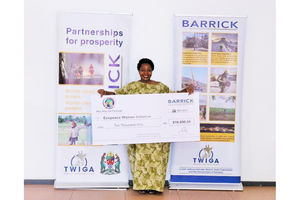Tanzania’s 10m poorest are engaged in farming, Tizeba says

Minister for Agriculture, Food Security and Cooperatives, Dr Charles Tizeba, talks to cotton farmers at Makundusi District in Serengeti, Mara Region during a past visit. PHOTO| FILE
What you need to know:
In his speech delivered during the House meeting last month Dr Tizeba said that the government was working hard to ensure that such 10 million people do jump to approach the middle class in the forthcoming years.
Dar es Salaam. At least 10 million of Tanzanians who are employed in Agriculture are the poorest of the poor, constituting 80 percent of poor people, according to 2018/19 budget speech of the minister of Agriculture, Dr Charles Tizeba.
In his speech delivered during the House meeting last month Dr Tizeba said that the government was working hard to ensure that such 10 million people do jump to approach the middle class in the forthcoming years.
“Agriculture is currently employing more than 65 percent of Tanzanians, and out of them 10 million people are the poorest, constituting 80 per cent of people employed in this sector,” the minister said.
According to him, the country has set a target of wiping out them by 2025 under the newly launched Second Phase of Agricultural Sector Development Programme (ASDP).
It is also important to note that existence of 10 million poorest people in this sector which is regarded as the mainstay of the economy has been associated with its sluggish growth of agricultural sector, recording a growth rate of not more than 4.3 per cent between 2013/14 and 2017/18 financial years.
Government budgetary figures for the same ministry have indicated that the sector recorded a growth rate of 4.1 per cent in 2013/14, 3.4 per cent in 2014/15 percent, 2.3 per cent in 2015/16, 2.1 percent in 2016/17 and 3.1 per cent in 2017/`18 per cent.
This clearly shows that the cherished high level of national economic growth of over seven per cent a year has not been translated into agriculture sector.
As far as contribution of agriculture to Gross Domestic Product (GDP), the minister said its contribution jumped from 29.1 percent in 2016 to 30.1 per cent in 2017 showing that the sector is in the smooth growth process.
Other budgetary figures released by the same ministry in previous years show the following figures on contribution of agriculture to GDP
But experts have raised counter arguments that there is lack of linkage between macro-economic growth rate and growth of agriculture.
One of them, Prof Honest Ngowi of economics based at Mzumbe University’s Dar es Salaam, who last week said that agriculture cannot transform the country into an industrial economy at the current level of growth at about three percent and it has been receiving relatively low budget allocation against the 2003 Maputo declaration of African states that resolved to set aside at least 10 per cent of their national budgets to agricultural sector.
The Repoa Director of Strategic Research and senior lecturer of economics based at the University of Dar es Salaam, Dr Abel Kinyondo says that agriculture in the country has less competitive strength to make Tanzanian products fetch lucrative prices in the global trade because there is chronic problem of low productivity.
When contributing to such budget proposals, several legislators also expressed concern over insufficient attention paid to the government to transform agricultural sector.
Regarding the challenge of maintaining an adequate food security, the minister said that the government was determined to improve storage facilities and revamp farm productivity countrywide under ASDP II.
The minister said the country is expecting to release a positive national report on Food Security situation by July this year, leaning on favourable weather conditions.
According to the budget speech, Dr Tizeba, said from May to June this year the ministry had begun to carry out the national food security situation for releasing a latest report.
From the same minister’s speech it has come clear that the country’s food security situation is still depending on the fortunes of whether that is why when the weather is good, food security is also positive and vice versa.
Under the 2018/19 budget, the responsible minister said that the country has attained a food security of 120 per cent due to favourable rains spreading countrywide.
Releasing the figures on the past food security situation, the minister said in 2016/17 the country experienced a shortage of 271,977 tonnes, while in the previous financial year the country faced food shortage of 172,841 tonnes. The shortages in that period were attributed to shortage of rains to a large extent,” said the minister.
Under the budget for 2018/19 the ministry of agriculture projects to spend a total of Sh162.2 billion against Sh165 billion projected in 2017/18 financial year.
Out of the Sh162.2 billion set aside for 2018/19 financial year, Sh119.5 billion is planned for development budget and Sh64.1billion for recurrent expenditure.
The budget also clearly shows that projections for the 2018/19 have been lowered because of the failure to allocate substantial earmarked funds for both development and recurrent expenditures in the 2017/18 financial year.
The responsible minister has also identified the major challenges facing the sector especially poor infrastructure to support the sector, declining outputs for some crops, weak co-operative organisations and weak financial services for that sector.
Under the same budget the ministry has identified eight areas of priorities, including increasing productivity and monitoring crop production.
Other areas are; pests control, development of special crops, improved investment climate, assessment of sector performance, improving the cross-cutting issues and lining up the ministry with migration to Dodoma.
Under the same budget the responsible minister promises to improve productivity of traditional crops like coffee, cashew-nuts, tea, cotton, sisal, pyrethrum and all food crops that play significant role in cushioning inflation.
Other promises include improvement of extension services, training institutes, improve supply of quality seeds supply, distribution of pesticides and insecticides and monitoring their quality.
The minister also promises to improve Tanzania Fertilizers Regulatory Authority and Bulk Procurement System of agricultural inputs and improvement Agricultural Seeds Agency, improve Tanzania Official Seeds Certification Institute and the eight agricultural research institutes.



